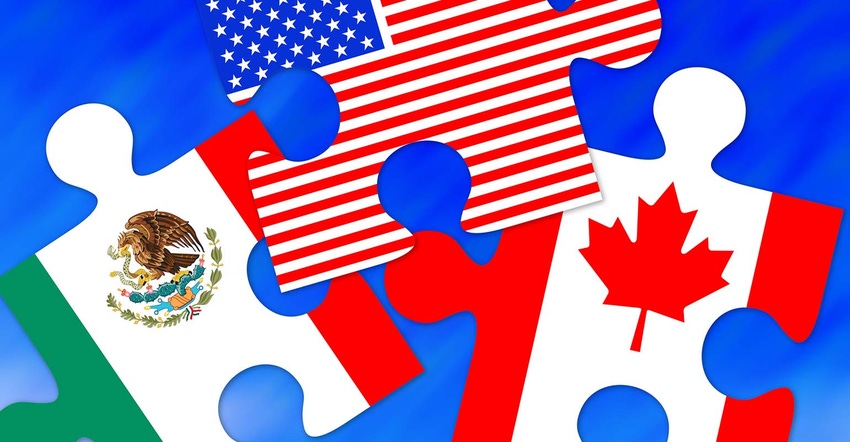
by Eric Martin and Andrew Mayeda
President Donald Trump said the U.S. won’t lower tariffs on steel and aluminum from Mexico and Canada unless the two countries agree to a revamped NAFTA that’s fair to the U.S.
“NAFTA, which is under renegotiation right now, has been a bad deal for U.S.A. Massive relocation of companies & jobs,” the president said in a tweet Monday. “Tariffs on Steel and Aluminum will only come off if new & fair NAFTA agreement is signed.”
Canada must treat American farmers “much better,” and Mexico must stop drugs from “pouring into the U.S.,” he added.
It’s the latest sign that Trump’s plan to impose stiff tariffs on steel and aluminum is overshadowing talks to overhaul the North American Free Trade Agreement. The president’s intervention may complicate a process that had already been yielding little progress on the most contentious issues.
The Mexican peso and Canadian dollar extended their losses after Trump’s comments. The peso declined 0.7% to 18.9628 per dollar, near the weakest level in almost two months. The Canadian dollar was down 0.8% to C$1.299, the weakest since July.
Until recently, the U.S. probe into the national-security risks of steel and aluminum has been considered separate from the NAFTA discussions. Over the weekend, Trump advisers gave no indication that any countries would be excluded from the tariffs.
The seventh round of negotiations wrap up Monday in Mexico City, with U.S. Trade Representative Robert Lighthizer due to meet with Mexican Economy Minister Ildefonso Guajardo and Canadian Foreign Minister Chrystia Freeland, just hours after Trump’s tweet. The three will address the media in the afternoon.
Trump’s decision on tariffs came on Thursday in the middle of talks, catching negotiators off guard. On Sunday, Trump’s senior trade advisers said the president doesn’t want any nation excluded from the tariffs, set to be imposed as early as this week. Canada, the biggest supplier of steel and aluminum to the U.S., and Mexico, the No. 4 source of steel, have asked to be excluded, and both indicated they will strike back if Trump includes them in the stiff duties.
At the NAFTA talks in Mexico City, negotiators agreed on two more topic areas and discussed details of Canada’s idea to redraw the way regional content for cars is measured. Yet work on the autos issue, which may hold the key to the entire deal, has been slow. It now looks impossible for negotiators to meet their goal of getting an agreement by the end of this month, especially amid the prospect of escalating trade tensions from the steel dispute.
“I applaud the president for targeting unfairly traded steel and aluminum,” Representative Kevin Brady, a Texas Republican and chairman of the House Ways and Means Committee, told reporters in Mexico City on Sunday. “But blanket tariffs that also sweep up fairly traded steel and aluminum, especially with trading partners like Canada and Mexico -- they should be excluded.”
Progress was made on the “nuts and bolts” of a new NAFTA deal, Brady said after being briefed.
Explicit Language
Trump’s announcement that he plans to impose tariffs of 25 percent on imported steel and 10 percent on aluminum landed like a bombshell during the seventh round of NAFTA talks, prompting expletives from a least one negotiator and casting a pall over the painstaking efforts to update the 24-year-old deal.
Mexico and Canada began negotiating with the U.S. in August at the initiative of Trump, who’s repeatedly said the NAFTA accord led U.S. companies to fire workers and move factories to Mexico. Trump has promised to negotiate a better deal for America or withdraw.
Most Contentious
The most contentious issues include a proposal to require more auto manufacturing in the U.S., seasonal barriers to farming goods, access to U.S. procurement deals, dispute resolution mechanisms, and a clause that would terminate the deal after five years.
Rules for cars were scheduled to play a prominent role over the past week, but the top U.S. negotiator on the issue was hurriedly summoned back to Washington on the first day of the talks to meet with representatives from American auto companies. Negotiators now plan to schedule more discussions on vehicles before the next formal negotiating round.
“It’s a delay on the original goals that they imposed on themselves of having the treaty done in a few months, but many of us understood that as a political statement rather than something feasible,” said Carlos Vejar, a lawyer at Holland & Knight in Mexico City who was part of the Mexican economy ministry’s negotiating team for more than two decades.
Important Strides
In Mexico City, negotiators finished work on regulatory best practices and transparency guidelines, and also reached agreement on rules for the chemicals industry, according to people familiar with the talks, who asked not to be identified because negotiations are private.
Negotiators have completed five of the roughly 30 topic areas, known as chapters, likely to comprise the updated deal. Still, they say important strides have been made in other areas, and a deal could come together quickly once the toughest issues are worked out.
“NAFTA negotiations are at a critical point where there are specific and very technical issues that are going to be elevated to a higher decision-making level, out of the negotiating table,” Vejar said. “Some of those issues will not be resolved until the very end of the negotiations, at the very last moment. Either you get the deal done, or you just can’t.”
When that last moment will be, and if Trump will have the patience to see the process through, is still anybody’s guess.
--With assistance from Josh Wingrove.
To contact the reporters on this story: Eric Martin in Mexico City at [email protected]; Andrew Mayeda in Washington at [email protected]
To contact the editors responsible for this story: Vivianne Rodrigues at [email protected]; Sarah McGregor at [email protected]
Elizabeth Wasserman, Elizabeth Titus
© 2018 Bloomberg L.P
About the Author(s)
You May Also Like




